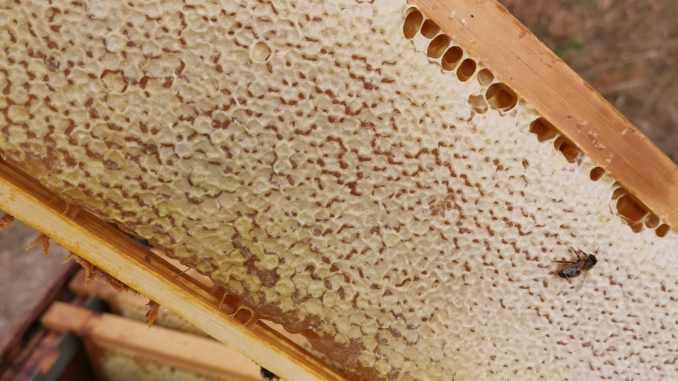
Now we are in July it is the time when wasps tend to make their appearance around our colonies. Being prepared is better than trying to stop wasps once they have targeted a hive. It is a good idea to reduce entrances down to around an inch or so, smaller than this for nucs. Once wasps have found a way into a hive it is very difficult to stop them. They can easily take out a weak colony or nuc in a short time. They then move on to the next target. Do get the foam ready and apply soon.
Swarming in my area was very busy until a week or so ago. Hopefully most colonies have finished with that now but the occasional one will consider swarming. Now we are past the longest day of the year bees tend to recognise this and realise they need to have enough stores for winter.
At the end of the season (typically end of July to early August) there are often super frames that are not capped over as the bees are waiting or hoping for another nectar flow. By having local knowledge of the local flora we will know if another flow is likely or not. It is best to leave supers on the hive for a few days when a flow has finished to allow time for the bees to ripen the latest batch.
Uncapped frames can be extracted but do the ‘shake’ test first. Hold the frame firmly with one side facing downwards and give a good shake. If no honey falls out it is safe to extract the frame. If honey does fall out put these frames back into a separate super and return to the bees for a few days, where they will finish ripening the honey.
To remind you, the Association has several extractors around the county which can be borrowed at no cost. Obviously, they may be in demand around early August so be aware that you may have to wait a little while.
Many beekeepers treat for varroa in August which means no honey should be present. Do have your treatments ready to use as some of them are time and temperature critical. If they are not applied as per instructions they are barely effective. This is a waste of money but will also compromise the colony as the winter bees will not be in good condition. Winter bees need to be healthy (and lots of them) for a colony to survive to next spring. Varroa was probably a cause for some of the large losses last winter.
Next Tuesday (4th July) we will run a Zoom session to talk over any of these points or anything else you may wish to ask. The invitation will be sent out nearer the time.
Finally, it is not too late to make nucs to overwinter and this is something all beekeepers should try to do in case of a bad winter. I have in stock two brand new polynucs the Association bought a while back. If you want to purchase one please get back to me – they cost £58.
